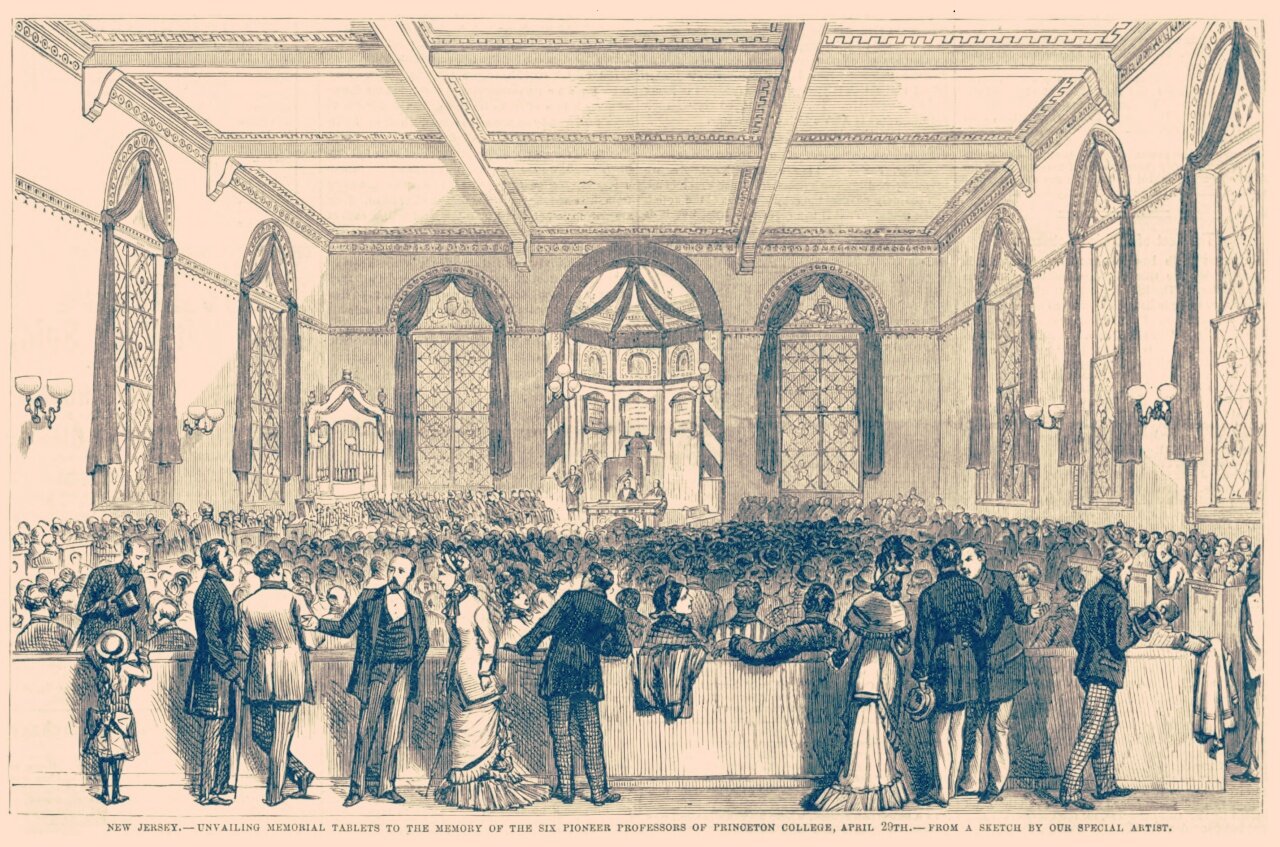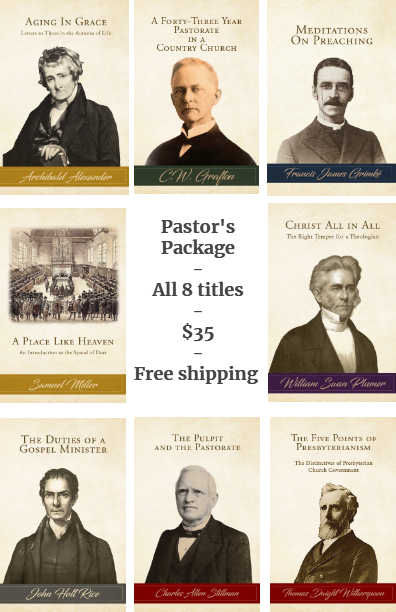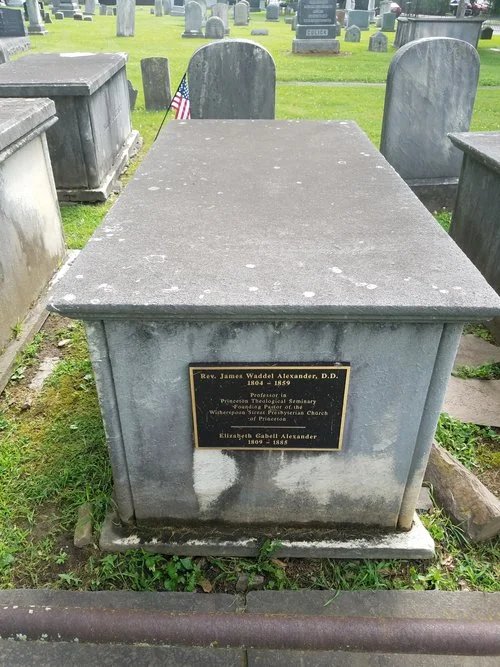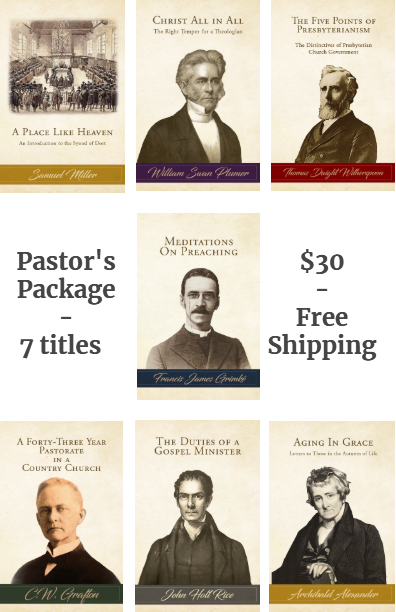All Christians are called, by the grace of God, to be followers and imitators of Jesus Christ. James Waddel Alexander, careful to emphasize that Christ is very God as well as very man, also maintained, in an helpful article which appeared in the Biblical Repertory and Theological Review Vol. 7, No. 1 (January 1835), that gospel ministers can and should look to Him as the perfect model for their particular holy calling: The Lord Jesus Christ the Example of the Minister.
Love - “As love was his great — his new — his last injunction to the disciples, so it was the reigning grace in his treatment of them: the very inspiration of his farewell discourse, and the crowning characteristic of his conversations after he had risen. Love embraced the infant; actuated his itinerancy, on foot, over the rough hills and torrid plains of Palestine; and flowed out to the poor and the dying in streams of relief; and breathed invitations wide as human woe; and uttered that lamenting cry: “O Jerusalem, Jerusalem, how often would I have gathered thy children together, even as a hen gathereth her chickens under her wings, and ye would not; behold, your house is left unto you desolate!” It was love that wept over the same city, in view of the very Golgotha where he was to die. It was love that was personified and held up to the view of angels and of God on that ‘place of sculls,’ and that cursed cross.”
Candour - “Christ makes no promises of ease, no offers of exemption from the cross; he refrains from no pungency of rebuke in order to gain favour; he wafts no flatteries to the great or the rich. Some would have followed him, whom he dismissed by simply showing that he was more homeless than the birds and foxes, or by explaining that all must be abandoned. ‘Think not I am come to send peace on earth — I came not to send peace, but a sword; for I am come to set a man at variance against his father, and the daughter against her mother, and a man’s foes shall be they of his own household. I am come to send fire on the earth, and what will I, if it be already kindled!’ — There went great multitudes with him, and he turned and said, ‘If any man come to me and hate not his family, yea his own life, he cannot be my disciple.’ ‘It is impossible but that offences will come.’ Christ denounced woes against every class of popular leaders, sects, rulers, and cities: and to the wealthy scrupled not an instant to say, ‘A rich man shall hardly enter the kingdom.’ And in proportion as we try to make the way easier than the Master has made it, we alter it, to the corruption of the church, and the ruin of souls.
Condescension - “As a man, and as a divine instructer, Jesus has taught us to ‘condescend to men of low estate.’ It was a token of his mission that he preached to the poor; and a taunt of his foes that he received sinners. Where good was to be done, there Christ was found, whether in the fishing-boat of Tiberias, the supper of the publican, or the tumult of the lower people. ‘Why eateth your Master with publicans and sinners?’ asked the Pharisee. ‘Because, (answered the Master for himself,) the whole need not a physician, but they that are sick.’ So far was he from the affected pomp of monkish virtue, and ascetic moroseness, that men pointed at his company, and falsely cried, ‘Behold a man gluttonous and a wine-bibber, a friend of publicans and sinners!’ This gentle condescension took the part of children when his followers would have sent them away, for he folded them in his arms, he laid his hands on their little heads, and said, of such is the kingdom of heaven.”
Heavenly prudence - “In all our vocabulary, there is scarcely a word more wronged than this. While the wiser heathen enrolled it among the cardinal virtues, the men of our day seem ready to tear it out as synonymous with timid cunning, which is the wisdom of weakness, or politic craft, which is the artifice of the wicked. It is no such thing, for in the words of Chief Justice Hale, prudence is used ‘principally in reference to actions to be done, and due manner, means, order, season, and method of doing them.’ Prudence is wisdom applied to practice. It is of God: ‘I wisdom dwell with prudence.’ It is predicated of God, who ‘hath abounded toward us in all wisdom and prudence.’ The minister of the gospel is as a sheep among wolves, he therefore needs to be wise as a serpent, while he is harmless as a dove. The great Exemplar should be his daily object of contemplation. The whole ministerial activity of Christ was governed by a wise reference to time, place, and circumstances. We do not find him using the same instrument for every work, or meeting all emergencies with an unalterable method. This is the way of the empiric. His discourses were adapted first to the hearers, then to the occasion. As Paul in following Christ, did not quote the rabbins to the Athenians on Mars’ Hill, or Aratus and Epimenides to the Hebrews, so the Master himself was wise in observing time and opportunity. He taught, not to cast pearls before swine, nor to put new wine into old skins. Remember the instruction of Nicodemus, the melancholy conference with the young man, the frequent disputations with lawyers, and the memorable dialogue at Jacob’s well. Mark the fitness to the occasion of his lessons on humility when ‘he took a child and set it by him’ and made it the text of a sermon: or on the bread of life, when the multitude followed him for loaves and fishes. — Jesus came into the world to die, but he did not expose himself to untimely peril. ‘No man taketh my life,’ said he. His unbelieving brethren would have constrained him to go to a feast of tabernacles; but he said, ‘My time is not yet come; the world hateth me; I go not yet up to this feast.’ And at the passover following, though his soul knew not fear, he departed and did hide himself from them. The Pharisees would fain have entangled him in politics, and made him out a leader of sedition. ‘Why tempt ye me, ye hypocrites,’ said our Lord, and with a simple coin baffled their malice, so that ‘they marvelled, and left him, and went their way.’ The Sadducees would gladly have caught him in the meshes of their Antinomian sophistry, but the scribe who asked him concerning the law, received in the sum of the decalogue a conclusive confutation. It would be endless to trace this quality in all its manifestations; if our eyes are open we shall descry it every day in the history of the Evangelists. And if we are wise, we shall use the lesson, to prevent our needlessly raising opposition, laying offences in men’s path, bringing gratuitous contempt on the truth, or outraging the useful decorum of life, or precedent of the church. True, in many cases, the proximate effect will be the imputation of pride, lukewarmness, or cowardice; but in the end, and when a man’s ways please the Lord, he maketh even his enemies to be at peace with him.”
Courage - “But there are extremes in religion, and the extreme of timorous caution is scarcely less to be deprecated than that of reckless fanaticism. When we turn our eyes to our divine example, we behold the golden mean. While our Lord was wise, he was undaunted. Courage is the fifth particular in which he is imitable. Not to dwell on the thought, that the whole mediatorial work of our incarnate God was a fearless assault upon the powers of evil, we may observe that holy boldness shone in his ministry. It is no sufficient reason for withholding truth, that it is disagreeable to ungodly men; and our Saviour sometimes so spake that not only were his adversaries filled with rage, but ‘many of his disciples went back, and walked no more with him.’ Under his piercing discriminations, and his claims to a divine character, the Jews were indignant and even frantic, so that, not content with reviling, they sought to kill him on the spot, and failing of this, obtained their hellish wish by a more circuitous method. Nevertheless he went right onward; boldly, yet full of love. If we observe the connexion, we shall see, that his tears over Jerusalem immediately preceded his fearless expulsion of the traders from the temple: so nearly allied were his courage and his love. Again and again, before large assemblies of the most learned, noble, and arrogant leaders, did he inveigh against them as hypocrites, deceivers, and doomed to unutterable woe. His teaching was the reverse of theirs: the people were astonished at his manner of preaching, ‘for he taught them as one having authority, and not as the scribes.’ This authority, so far as it pertained to Christ’s mediatorial character, the preacher may not assume, but he may, under his commission, ‘speak and exhort, and rebuke, with all authority,’ letting no man despise him; and rebuking them that sin, before all, that others also may fear. There are times, even now, when hearkening to God more than unto men, he may be bold in our God: for if we seek to please men we are not the servants of Christ.”
Tenderness - “The spirit of our Master’s ministry, was eminently that of tenderness. It is the sixth in this constellation of graces. Where shall we begin, where all is the very ideal of gentle, sympathizing affection? It was predicted, ‘a bruised reed shall he not break, and smoking flax shall he not quench.’ It is impossible to imagine that such sentiments as his were ever uttered with the frown of menace, or the rudeness of objurgation. When his ministry was for the time without effect on some, he gently alludes to a game of Israelitish children, and says, ‘we have piped unto you and ye have not danced, we have mourned unto you and ye have not wept.’ When a rich young noble turns away, Jesus does not pursue him with a fulmination, but is very sorrowful. The mother of the sons of Zebedee makes a request, so startling, that ‘the ten were moved with indignation against the two brethren,’ but Christ simply, and tenderly, uses the incident to repress ambition. And the spirit of his preaching is well expressed in the kind invitation ‘come unto me all ye that labour and are heavy laden, and I will give you rest.’”
Zeal - “In order to show, however, that the tenderness of Christ was not incompatible with fervour, let us further adduce his zeal. Zeal is not good in itself, being simply, passionate ardour, which may be for good or evil. Much that passes under the name is strange fire. Such was that of the beloved disciple when he forbade a certain person to cast out devils in Christ’s name; or of the same apostle and his brother, when they seemed ready to call fire from heaven to consume the inhospitable Samaritans. But our Redeemer ‘turned and rebuked them, and said, Ye know not what spirit ye are of.’ The ardour of Jesus was a serener glow, yet it was not inefficient. Under its impulse, he overturned the tables of the money-changers, and scourged them from the temple; but even here it would seem to be only another aspect of love, for it is instantly added, ‘and the blind and the lame came to him in the temple and he healed them.’ His disciples remembered that it was written: ‘the zeal of thine house hath eaten me up.’ Even when suffering for food, he declared that it was his meat and drink to do the will of the Father. And in this spirit he lived and died. Could we, brethren in the ministry, catch the holy ardour which bore forward our Master through cares and anguish — could we, like him, forget our selfish interests in the great work of rescuing souls and glorifying God — could we even, like an humbler model, stand immoveable amidst danger and flattery, so that we might finish our course with joy, and the ministry which we have received of the Lord Jesus, we might justly hope to number a hundred converts where we sadly welcome one, and expect to shine as stars in the firmament of glory.”
Humility and meekness - “Passing now to other characteristics, let me observe, that Humility and Meekness are nearly allied, and that they both adorned the ministry of Christ. It was his oft-repeated maxim, ‘whosoever exalteth himself shall be abased.’ And he taught that even little ones were not to be despised. How touching was his exemplification of this lowliness. ‘The Son of man (such was the language of his conduct) came not to be ministered unto, but to minister.’ He humbled himself, and made himself of no reputation: he took upon him the form of a servant; and we are exhorted by Paul to let the same mind be in us. ‘Whether is greater,’ — he once affectingly asked — ‘he that sitteth at meat, or he that serveth? Is not he that sitteth at meat? But I am among you as he that serveth!’ And when he bowed down to the menial service of washing his disciples’ feet, just when he was about to die for them, he said: ‘Know ye what I have done unto you? Ye call me Master and Lord, and ye say well; for so I am: If I then, your Lord and Master, have washed your feet; ye also ought to wash one another’s feet; for I have given you an example, that ye should do as I have done to you. Verily, verily, I say unto you, the servant is not greater than his Lord; neither he that is sent greater than he that sent him.’ Under injuries, our Lord was exemplary in meekness: ‘who when he was reviled, reviled not again; when he suffered, he threatened not; but committed himself to him that judgeth righteously. He was derided, he was maligned, he was pursued, he was encompassed with insults. ‘Reproach,’ said he in prophecy, ‘hath broken my heart.’ He was accused of sedition, taunted as a madman, a Samaritan, a demoniac, a blasphemer, yet he resented not. See him in his last sufferings, ‘he was oppressed, and he was afflicted, yet he opened not his mouth: he is brought as a lamb to the slaughter, and as a sheep before her shearers is dumb, so he opened not his mouth.’ Let this move us to pardon affronts from whomsoever received, forbearing one another and forgiving one another, if any man have a quarrel against any: ‘even as Christ forgave you, so also do ye.’”
Laborious and painful assiduity - “A ninth particular, is the laborious and painful assiduity of the Lord Jesus Christ. In this he was followed by the Apostle of the Gentiles. In this he must be followed by us, if we would stand clear of the blood of souls. A minister must not only not be slothful; he must be above the suspicion of sloth. Paul’s language to Timothy conveys the idea of rapid and pressing activity : “preach the word — be instant — in season — out of season.” Be wholly in these things. That is, be in nothing else. The minister of Christ is not called to be a scientific inquirer, a politician, an agriculturist, a literary devotee — though the parsimony of the churches or the desire of avoiding offence, have sometimes forced holy men into secular pursuits; still less is he called to be a convivial companion, a fashionable flutterer, or a habitual idler ; but to give himself continually to prayer and the ministry of the word. To such a life he has the sacred incitement of example. He went about doing good. On the mount, on the lake, on the strand, in the field, in the highway, in the house, by night, by day, in Galilee, in Samaria, in Judea, in the synagogue, and in the temple, Jesus was labouring. When the plot was maturing, when life was ebbing, when the last passover was almost begun, he spent his nights on Olivet, and his days teaching in the temple. We read that he began ‘early in the morning.’ ‘I must work the works of Him that sent me while it is day: the night cometh, when no man can work.’ Wearied with the greatness of his way, he nevertheless taught the Samaritan woman, as he leaned upon the well. And even when apprehended, he turned aside from his own woes, both in Gethsemane and on his way out of the city, to drop gracious words on his followers. In the forty days previous to his ascension, he still taught, and the language of his whole example to each of us is, ‘Let the dead bury their dead, but go thou and preach the kingdom of God.’”
Holiness and devotion - “To sustain a gospel minister in such labours, something is necessary beyond habitual diligence, or mere professional zeal. There may be great stir and bustle, and activity, and yet no gospel efficiency. What we need is a spring of holy influence always within us, gushing out like a river-head of living waters. What shall secure this? Answer, the grace of God in the heart, working holiness and devotion — the tenth trait in our Lord’s ministerial character. Oh that every pastor could say to the people whom he serves, or has served, ‘Ye are witnesses, and God also, how holily, and justly, and unblamably we behaved ourselves among you that believe.’ Paul could say so, for he followed Christ; and Christ was ‘holy, harmless, undefiled and separate from sinners.’ After a certain tour of preaching and healing, we are told, ‘Jesus returned in the power of the Spirit into Galilee, and he taught in the synagoges, being glorified of all.’ The indwelling Spirit was in the head, as in the members, a spirit of grace and supplication, and frequent are the incidental but pathetic notices of our Lord’s retreats for private devotion. By these Olivet and Gethsemane were signalized, long before his final agony. Here he ‘rejoiced in spirit,’ here he doubtless groaned and wept, here he cried, ‘even so Father, for so it seemed good in thy sight.’ How often did he, after days of weariness, spend the nights in solitary watching and prayer! While the storm was on the lake, Jesus, having dismissed an immense audience was gone ‘up into a mountain apart to pray: and when the evening was come, he was there alone.’ When the fame of him increased, ‘he withdrew himself into the wilderness and prayed.’ The seventeenth chapter of John is a blessed fragment of his intercessions. In the garden he prayed in agony: he was sorrowful, sore amazed, very heavy, yet he prayed ‘with strong crying and tears.’ And in that very hour of darkness he exhorts us, ‘watch and pray.’ On this point we need say no more.”





















